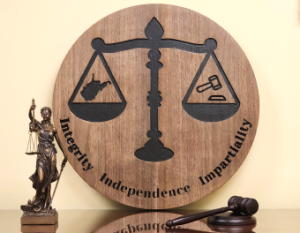JUDICIAL INVESTIGATION COMMISSION OF WEST VIRGINIA

The Supreme Court of Appeals of West Virginia established the Judicial Investigation Commission to determine whether probable cause exists to formally charge a judge with a violation of the Code of Judicial Conduct, to govern the ethical conduct of judges and to determine if a judge, because of advancing years and attendant physical and mental incapacity, should not continue to serve.
A "judge" is defined as "anyone whether or not a lawyer who is an officer of the judicial system and who performs judicial functions including but not limited to Justices of the Supreme Court of Appeals, Judges of the Intermediate Court, Circuit Judges, Family Court Judges, Magistrates, Mental Hygiene Commissioners, Special Commissioners, and Special Masters."
Contact Information
Teresa Tarr, Counsel
Brian J. Lanham, Deputy Counsel
David Hudson, Investigator
Pam Schafer, Executive Assistant
The West Virginia Judicial Tower
Suite 700A
4700 MacCorkle Ave., S.E.
Charleston, West Virginia 25304
(304)558-0169
(304)558-0831 FAX
Office hours are Monday through Friday from 8 a.m. to 4:30 p.m.
Filing a Complaint
Complaint Form
Any person may file an ethics complaint against a judge. However, a complaint that is filed more than two (2) years after the complainant knew, or in the exercise of reasonable diligence should have known, of the existence of a violation of the Code of Judicial Conduct may be dismissed for exceeding the statute of limitations.
Procedure for Handling Complaints
Flowchart of how a complaint is handled
Complaints filed with the Commission are referred to counsel, who investigates the matter, asks the respondent judge for a response, or sends it directly to the members of the Commission for study prior to consideration at the next meeting. Complaints that directly go to the Commission for consideration may be dismissed for lack of probable cause, ordered sent to the judge for a reply or referred to an investigation.
A judge shall be notified in writing of the nature of the complaint. The judge has 10 days after the date of the notice to file a written response. All decisions on whether probable cause exists to refer the complaint to the Judicial Hearing Board and all decisions to dismiss complaints are made at meetings with a majority of the members in attendance. Parties are contacted about the action of the Commission after a decision has been made on a complaint.
Some complaints contain more than one allegation against a judge, and the Commission may dismiss part of a complaint and find probable cause on part of a complaint.
The Rules of Judicial Disciplinary Procedure require that all information provided, all documents filed and all testimony given with respect to any investigation or proceeding shall be privileged in any action for defamation. All members of the Commission and the Judicial Hearing Board, the Office of Disciplinary Counsel, and their employees, are absolutely immune from civil suit in the same way members of the judiciary in this State are absolutely immune from civil suit for any conduct in the course of their official duties.
Proceedings of the Commission are confidential unless they result in an admonishment or formal statement of charges.
If the Commission determines probable cause does exist and formal discipline is appropriate, the Commission files a formal charge with the Clerk of the Supreme Court of Appeals so it can be heard by the West Virginia Judicial Hearing Board. After the formal charges are filed and served on the judge, all documents filed with the Clerk of the Supreme Court and the Judicial Hearing Board are public.
If the Commission determines probable cause exists but that formal discipline is not appropriate under the circumstances, the Commission shall issue a written admonishment to the judge. The judge has 14 days after receiving the admonishment to object. The written admonishment is public. If an objection to the written admonishment is filed timely, the Commission shall file a formal charge with the Clerk of the Supreme Court of Appeals. Admonishment shall not be administered if: (1) the misconduct involved the misappropriation of funds; (2) the misconduct resulted or will likely result in substantial prejudice to a litigant or other person; (3) the respondent has been disciplined in the last three years; (4) the misconduct is of the same nature as misconduct for which the respondent has been disciplined in the last five years; (5) the misconduct involved dishonesty, deceit, fraud, or misrepresentation by the respondent; (6) the misconduct constituted a crime that adversely reflects on the respondent's honestly, trustworthiness, or fitness as a judge; or (7) the misconduct was part of a pattern of similar misconduct.
A judge or the Administrative Director of the Courts may, by written request to the Commission, seek an advisory opinion as to whether certain specific actions contemplated may constitute a violation of the Code of Judicial Conduct. The Commission may render in writing such advisory opinion as it may deem appropriate. An advisory opinion is not binding upon the Judicial Hearing Board or the Supreme Court, but shall be admissible in any subsequent disciplinary proceeding involving the judge who made the request.